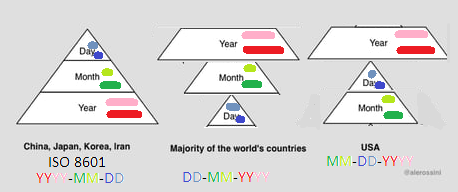America officially switched to the metric system decades ago. We just don’t use it on a daily basis, but officially the US is metric.
In 1988 Congress passed the Omnibus Trade and Competitiveness Act, which made the metric system the preferred system of weights and measures for U.S. trade and commerce.
In 1991 President Bush issued Executive Order 12770, which mandated the transition to metric measurement for all federal agencies.
I remember learning all metric in elementary school in the early to mid 80s much to my mother’s chagrin (any thing I learned that was different than what/how she learned in Catholic school was bad, including a second language). Then having to relearn standard in middle school. I still have to count all of the lines on a tape measure.
As a metric-raised guy I find extremely difficult following the tutorials of woodworkers that start putting 2feet 3 inches and 9/16 in the measurements that converts to 700,0875mm wich i guess is an approximation of 70cms
Bullshit. ISO 8601 IS THE SUPERIOR DATE STANDARD
Tomorrow is 2024-08-30. DEAL WITH IT.Metric is about measurements, not formatting. The date measurement is in days, months, and years for both ISO 8601 and what’s shown.
Stardate, 2024-08-30T06:34:17.993Z
Hilariously, Star treks “stardates” are not uniform. The format shifts season to season and show to show.
It’s standardized now
While you’re at it, switch over to DD/MM/YYYY for the date format. The only 2 configurations that make sense is that or YYYY/MM/DD. Either go general to specific or specific to general, MM/DD/YYYY makes no sense.
It makes sense because of the way we say the date - eg today is November 21st, 1999. We don’t usually say it’s the 21st of November in conversation.
Eta: I wasn’t giving any value statement for the date order lol. Just explaining the rationale for why the date is written in that order - that’s how people talk. If linguistics as a concept bothers you, well… that’s on you.
Other countries do
Here in the UK we would say “I will visit you on the 19th of September” for example. I have never heard anyone say the month first. It’s just different custom. We also drive on the other side of the road…! At the beginning it would have been helpful if the world would have agreed on a standard either way. Then it would stop confusion. (And less car accidents from people on holiday/vacation on the wrong side of the road! 😅
DD/MM/YYYY is absolutely crazy. There is only one format that makes sense.

Just draw the triangle the other way for DD/MM/YYYY. It makes sense that people want to know the day first, that is the most important part tbh
No, the most important part is having a standard to conform to that makes sense, like ISO 8601…
No, switch to ISO8601
Overly strict for anything day to day, overly permissive for anything important.
RFC 3339 is where it’s at.TIL.
For purposes of this post though, RFC 3339 and ISO8601 are identical. Dates in the format YYYY-MM-DD, so 2024-08-29 is both RFC3339 and ISO8601 compliant.
Not an expert, just spent around 2 minutes looking at https://ijmacd.github.io/rfc3339-iso8601/
Months are the craziest, weirdest, stupidest measure humanity has used for this long. ISO8601 week dates make more sense, or even the French Revolutionary Calendar. Humans organize all of society by weeks, not by months. Compare last January to next January, or last February to next February for metrics. Do they have the same number of weekdays vs weekend days? Even if they do, do they happen at the same point in the month so you can compare the flow of the month? Now compare two weeks, and that’s apples to apples. Group by weeks instead of months and your irregular, bumpy graph smooths right out. We only hang on to Gregorian months out of inertia.
Months are one of the best ways for a low-tech/pre-tech culture to keep track of dates (using the Zodiac for something it can actually do—act as a calendar you can see no matter where you are in the world).
Keeping them around is a sensible fail-safe in case some nuclear power sets us back into the dark ages.







